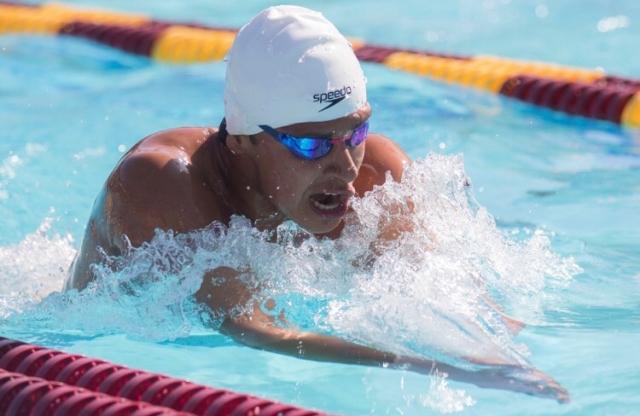From Swimming at the Public Pools to Swimming for State
Jonathan Olvera nominated Mt.SAC’s 2019-2020 Spring Athlete of the Year
Before every dive that starts most races, swimmers train to conquer every hurdle that life throws at them. Once the signal goes off and the race begins, all those hours of hard work get put on display for everyone to watch. In between the hours of practice in the pool, swimmers also have to deal with life’s hardships that occur outside of the pool.
Jonathan Olvera, a 20-year old psychology major from Baldwin Park, California is one of those swimmers. Olvera is the son of two immigrant parents from Mexico and is also a first generation college student. Olvera never had a pool growing up, in fact he said he and his sister are the first people in his family to even learn how to swim.
Olvera first learned how to swim at the Morgan Park Aquatics Center in Baldwin Park at 9-years-old during a summer swimming program. Since then he has been swimming competitively for 10 years. “At first it wasn’t really because I liked it,” Olvera said. “My parents saw something in it and the coaches saw something in it.”
“I just stayed at swimming because at first my parents made me, but throughout the years I started liking it,” he said.
Instead of attending a high school near Baldwin Park, Olvera decided to attend Glendora High School because of their swim program. “It was a faster division swimming wise, and it was better academically as well,” Olvera said.
However, the change of area made Olvera feel different at first because he was used to being around people with similar backgrounds as him.
“Elementary and middle school here at Baldwin Park it’s mostly Hispanic, people like me, either they came here from a different country when they were young or they are also first generation here in the United States,” Olvera said. “Going to Glendora you just feel, not left out, but you just feel different. It’s very different.” According to Olvera, the student demographics of Glendora High School when he attended were about 60% white with the remaining 40% being a mix of African-American, Hispanic, and Asian students.
At Glendora, Olvera also had to deal with not knowing anyone except his club coach he had met before highschool and a couple of other swimmers he had met through club competitions. Swimming gave Olvera a way to get acclimated to the new school and it helped him make friends in a new environment. “Going into Glendora I was already at a high level in my swimming years, I would compete [and] represent California at some points.”
Olvera was on varsity throughout highschool, and was the Most Valuable Player on the varsity swim team during his years at Glendora. He said that attending Glendora was a good choice for him because he was always motivated to get better due to the amount of fast swimmers there.
When it came time to decide on a college, Olvera received athletic scholarships from four-year universities but decided to go to Mt. SAC to save money. He also chose Mt. SAC because their aquatics program is well known. “Even though I was getting a scholarship to other schools, it wasn’t a full scholarship, it was 20% to 25% of my academics covered, it wasn’t enough,” he said.
The decision was extremely difficult for Olvera because attending a four year university was a goal of his, but he knew it would have been too much of a financial burden for his parents. “I wanted to go to [a] Division I right after highschool but I had to see the bigger picture, and it was best for me to save money and not get in debt,” Olvera said. “We don’t have the money to pay for state colleges.”
Olvera said his experience at Mt. SAC proved to him that the stigma surrounding community colleges was not true. “I got a lot of that from teammates: ‘junior colleges are for dumb people’ or ‘college dropouts who want to come back in’,” he said. “Obviously those negative comments during highschool were false, they were talking negatively about Mt. SAC, but Mt. SAC is great. I had a great time here.”
Olvera competes in the 200-meter butterfly, the 400 individual medley, and the mile. During his freshman season he managed to finish top three in one of his events and top five in a couple other events. The team was a conference champion and they finished third as a team in state qualifiers.
Mt. SAC recently named Olvera as the 2019-2020 Mens Spring Athlete of the Year. He was also the winner of the 2020 South Coast Conference Don MacKenzie Scholarship award, which recognizes two student athletes with strong academics and high performance in their sport. The award also comes with $1,000 which Olvera said is a big help.
Being a strong swimmer, Olvera has been working as a lifeguard, a swim instructor, and a swim team coach. COVID-19 has impacted his source of income and he has had to find other ways to make money. “Right now all the pools are shut down so I’ve had to find a job,” Olvera said. “The only job I could find is working part time at McDonalds and I’m going to school.”
Aquatics as a sport generally does not draw large crowds like college football or college baseball, but that does not bother Olvera. “I’ve seen an increase in more people paying attention to swimming actually,” he said. “I feel it’s due to Michael Phelps, he’s the greatest Olympian of all time, he has 23 gold medals. Nobody has ever won 23 gold medals and it came from a swimmer.”
Swimming, Olvera said, is a safer sport than football or soccer. “There’s a lot of athletes who get injured during highschool and then they can’t even go on to college because they had a bad accident,” Olvera said. “With swimming you don’t really get injured.”
Olvera transferred to the University of La Verne where he plans to continue swimming. “I’m happy here at La Verne. Great swimming, great school. I’m excited to come here,” he said.
Every time Olvera is in the pool he feels like he’s in his second home. “I’ve been swimming for ten years, it’s my life. Every time I swim, I feel peace,” Olvera said. “Everyday you practice to get better, to be the best you can be.”
On his off days Olvera enjoys swimming at the beach to relax and if he could be any aquatic animal he would be a swordfish, because in swimming when the whistle blows you have to be quick and agile, “I feel like the swordfish represents that, if it’s in danger or if it feels like hunting something, he’s a fast swimmer.”




